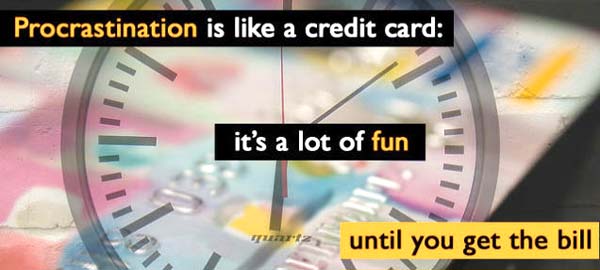Success Advice
10 Effective Strategies To Fight Procrastination
Procrastination might seem harmless enough; but when you start to tally up all the time you have wasted in the past week, month, or year, it becomes significantly more disconcerting.
As somebody who struggled for years with procrastination (to the point where it had disastrous consequences on my education and professional life) I understand the pain that can be caused by failing to achieve the things you desire in life.
If you are tired of wasting precious moments of your life to procrastination, then pay close attention. In this article you are going to discover ten effective strategies to help you fight procrastination and get your groove back.
I’ve tested these techniques myself (and helped implement them in the lives of others) and strongly believe that they will work for you.
10 Ways To Stop Procrastinating
1. Set Yourself a Goal to Achieve
One of the most effective ways to fight back against procrastination is to have a goal to work towards in your life. Whether it is something as simple as completing your next essay, through to running a marathon for the first time, a goal will help you focus your energies and provide impetus to get up and get things done.
Just remember that it pays to set a realistic goal. So if you’ve never so much as picked up a microphone before, don’t expect to be a virtuoso singer by the end of the month. Setting unrealistic goals only places you in a position of likely disappointment, which is not going to encourage you to take action.
2. Discover Your Biggest Distractions
All of us are liable to be distracted by certain things. Whether it is social media, texting, or good old fashioned chinwagging with colleagues, there is bound to be something that has a tendency to keep you distracted from your work.
You need to identify your biggest distractions and time-wasters, and then try to eliminate or block them when you need to get work done.
For digital distractions, such as social media, the solution is surprisingly easy; there is a plethora of tools online that you can use to temporarily block websites for a set duration of time.
I’m a big fan of the StayFocusd extension for Google Chrome, which makes blocking websites like Facebook and Twitter an absolute breeze.
If you find yourself being distracted by coworkers, friends in the library, or family members around the house, then invest in a good pair of noise cancelling headphones for when you need to be working. These serve two purposes; firstly, you will be able to block out distracting noises. Secondly, you will put up a “defensive barrier”that discourages those around you from interrupting your work flow.
I’ve always found that the simple act of wearing a pair of headphones while working in an office prevents colleagues from interrupting me, except under truly important circumstances.
3. Keep Track of Where You are Wasting Time
In the realm of personal finance it is very much au fait to keep track of the money you spend on a daily basis. From that Starbucks coffee on the way to work, through to a takeaway lunch; the small amounts of money you spend all add up over time to create a big figure that you could have saved.
Unfortunately, this activity has not proven very popular when it comes to seeing where you spend the time in a day. In order to get a good perspective on just how much time you might be wasting due to procrastination, you need to make a concerted effort to record where you are spending your time.
I suggest carrying around a notebook and pen for the next few days, and then write down the time you spend doing everything. Keep track of seemingly insignificant events as well, such as the time spent showering, or cooking dinner, or doing laundry.
The whole point here is to build up an accurate picture so you can.
a) See how much time you are wasting in an average day
b) Work out exactly how you are wasting that time
This will be a truly eye-opening experience, which help put procrastination in context and inspire you to take action. You can then use the information you gather to help you identify particular activities that waste a lot of your time.
4. Use Productivity Apps
In the age of the smartphone there is an almost endless supply of quality apps and programs that you can carry with you wherever you go, which will help you to beat procrastination and manage your time more effectively.
I’m a big fan of using “to-do list”apps that allow you to create a list of tasks you wish to complete in a day, and then check off as you complete them. There are so many excellent choices for both iPhone and Android, although I personally use an app called Todoist.
Having a list of tasks you want to complete is a great way to structure your day and focus your effort – and using a productivity app brings a whole new world of convenience to your fingertips.
5. Identify Crucial Work & Attack it First
Although I’m a big fan of trying to get everything complete, I also believe that prioritisation of work is extremely important – and is something that can really help you to become more motivated and fight back against procrastination.
You need to identify the most crucial/important work on your schedule, and then do that first. There’s no point in wasting your time, energy, and drive on doing insignificant tasks first (although it is always tempting to do so if those tasks are easier to complete).
Make sure you tackle any mission-critical work first, so that you can dedicate the maximum amount of energy possible to it. If you do less important work first, then by the time you have completed that you will probably feel too drained to effectively tackle the important tasks.

6. Look for (Ethical) Shortcuts
There is a popular (and sadly misattributed) quote by Bill Gates that describes how he prefers to hire lazy people, as they tend to find the swiftest solutions to a problem.
Although it would be crazy to describe laziness and procrastination as a positive, you can leverage off these traits in order to look for shortcuts when doing work or performing any given task.
For example, I used to work in a marketing agency where I had to create monthly reports in Excel, in order to show clients where their budget was being spent. The process I was taught for this involved a number of redundant steps, as well as actions that I had a hunch could be better automated in Excel.
I did a quick bit of research and discovered some Excel functions I could use to practically automate the entire reporting process. Although I was taking an unsanctioned shortcut, the output was exactly the same and I was able to complete three reports in the time it usually took to do one!
However, if you are going to go down the shortcut route, then you need to ensure that whatever you do does not have a negative impact on the quality of your work.
If taking a shortcut means notably worse results (or, in even more serious circumstances, that someone could suffer harm or loss because of your actions) then it’s best to do the work properly – even if that takes a whole lot more time.
7. Visualize Success and Motivation
The power of visualization is real, and it can bring amazing benefits to your life. If you’re struggling with procrastination or lack of motivation, then I want you to give visualization a try.
What you need to do is focus your mind on what feeling motivated and taking action would be like. To do this it helps to visualize yourself doing a particular task or activity (e.g. going for a run).
Bear in mind that visualization is more complex than giving a passing thought to something you want to do. It requires true dedication and focus to achieve results from visualization. You need to imagine the sights you will see, sounds you will hear, and emotions you will feel, when you achieve what you wish to complete.
8. Improve Lifestyle Factors
In order to stop procrastination, find motivation, and become more energetic, you need to also look at lifestyle factors. I’m talking about things like diet, exercise, and sleep.
In my experience, people who have poor diets, exercise infrequently, and get insufficient sleep, are all more prone to procrastination. The reasons for this are numerable; what matters is the change you can make!
You don’t need to totally overhaul your life and go all super-healthy on everyone. However, by making some modest lifestyle changes you can really improve your chances of becoming more energetic and motivated – which, in turn, will help you to beat procrastination.
In order of importance, I would recommend that you focus on:
- Getting regular exercise to elevate your mood and enhance mental focus
- Ensuring you get sufficient sleep, so that you have the energy you need to be active
- Improving your diet (reduce the amount of processed/junk foods you eat, and increase the amount of vegetables, fruit, and “brain foods”, such as oily fish in your diet).
9. Break Tasks Down Into Smaller Parts
Another excellent strategy for making work easier (and more appealing to do) is to break tasks down into smaller parts.
For example, that essay you need to write by Monday morning might seem like a massive mountain now …but if you break it down into its constituent parts – research, intro, argument, conclusion, proofing etc – it suddenly becomes a series of small hills!
Almost everything you could ever hope to do in life can be broken down into smaller parts, which you can then tackle head-on. Small tasks are easier to complete, require less time, and are less daunting to attempt.
10. Force Yourself to Take Action
My father used to tell me that even when you’re down, lacking energy, and feeling unmotivated, one of the best steps you can take is to literally force yourself (against your own will) to take action. This is a rather strange concept to grapple with, but basically you need to pick something you need to do, and then accomplish it …even if you aren’t feeling so much as slightly motivated to do so.
Here’s an anecdote to help explain my point: I had a friend who was desperate to get in shape, but he could never quite bring himself to get to the gym; his reason being that he didn’t feel motivated at the time to do so. I told him one evening that he needed to force himself to go to the gym, and that as soon as he hopped on the treadmill he would feel much better for it.
Lo and behold, this simple act of encouragement helped, and he managed to cajole himself into taking action. Since that first baby step he has become a true gym junkie, and is deservedly reaping the rewards.
Forcing yourself to take those baby steps will have a similar effect in your life. Get over the feeling of not wanting to do something, and just do it. After all, the best solution for procrastination is to get something done.

Conclusion
Procrastination isn’t an incurable disease that has to linger over all of your life. It is something that can be overcome with the right mental attitude and resources.
Start dedicating yourself to beating procrastination, set a goal to be motivated, and watch the results materialise when you start to take action.
Business
The Simple Security Stack Every Online Business Needs
Most small businesses are exposed online without realising it. This simple protection stack keeps costs low and risks lower.

Running a business online brings speed and reach, but it also brings risk. Data moves fast. Payments travel across borders. Teams log in from homes, cafés, and airports. (more…)
Business
If Your Business Internet Keeps Letting You Down, Read This
From smoother operations to better security, dedicated internet access is quietly powering today’s high-performing businesses.

Today, a dependable internet service is the bedrock for uninterrupted business operations. Many organizations rely on stable online connections for communication, data transfer, and customer interaction. (more…)
Did You Know
How Skilled Migrants Are Building Successful Careers After Moving Countries
Behind every successful skilled migrant career is a mix of resilience, strategy, and navigating systems built for locals.

Moving to a new country for work is exciting, but it can also be unnerving. Skilled migrants leave behind familiar systems, networks, and support to pursue better job opportunities and a better future for their families. (more…)
-

 News2 weeks ago
News2 weeks agoBrandon Willington Builds 7-Figure Business by Ignoring Almost Everything
-

 Health & Fitness3 weeks ago
Health & Fitness3 weeks agoWhat Minimalism Actually Means for Your Wellness Choices
-

 Did You Know3 weeks ago
Did You Know3 weeks agoWhy Most Online Courses Fail and How to Fix Them
-

 Business3 weeks ago
Business3 weeks agoIf Your Business Internet Keeps Letting You Down, Read This
-

 Business1 week ago
Business1 week agoEntrepreneur’s Guide to Pay Stubs: Why Freelancers and Small Business Owners Need a Smart Generator
-

 Business5 days ago
Business5 days agoThe Salary Shift Giving UK Employers An Unexpected Edge
-

 Business7 days ago
Business7 days agoThe Simple Security Stack Every Online Business Needs
-

 Scale Your Business6 days ago
Scale Your Business6 days ago5 Real Ways to Grow Your User Base Fast




























8 Comments